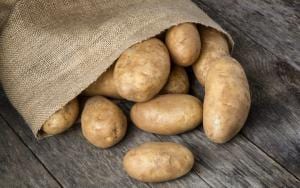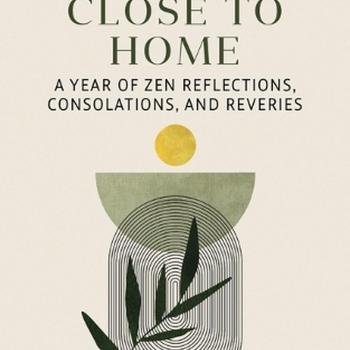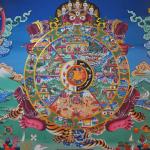THE PRICE OF POTATOES IN IDAHO
A Small Meditation on a traditional Zen Koan
James Myoun Ford
A student of the intimate way asked master Qingyuan, “What is the essence of Buddhism?” Qingyuan replied, “What is the price of rice in Luling?”
Book of Serenity, Case 5
I’m very fond of this case. Admittedly, for a number of reasons.
Among the reasons I love this case is that it features Qingyuan Xingsi. This is the only case in the collections I formally worked with, with my koan teachers that features him. Qingyuan is one of the famed Sixth Ancestor, Dajian Huineng’s five dharma heirs. In that period where myth and dream and history blend and are not completely extricable one from the other, Qingyuan would birth the historical Soto lineage. So, my direct ancestor in the Zen way.
Of course, anyone who has thrown their heart and body into the Zen way can claim all of these people as ancestors. And, it is always, well, almost always a wonderful thing to contemplate the doings of one’s direct ancestor.
Most of all this koan is a direct pointing to the healing of our hearts as individuals. And further it points to how we might engage this broken world. It reveals the intimate way full and unadorned.
Of course it is also a carefully laid trap for the unwary. Although the trap is set by our own egos.
I love how it resonates with one of those slogans of American culture, “the price of potatoes” most commonly in Idaho. A turn of phrase probably adapted from the older “What does it have to do with the price of tea in China?” In that use it is a non sequitur. In another possible origin for the price of potatoes, we find a term of art in to explain demand economics illustrated by the horrors of Ireland’s Great Hunger. Such a layered bit of cruelty and sadness. And profit.
The case resonates particularly closely to two cases in the Blue Cliff Record, both featuring the old venerable Zhaozhou Congshen. In case 30, another student of the intimate way asks him, “I understand you met the venerable Nanquan face to face. Is this true?” To which the old master replied, “Chenzhou produces giant radishes.” Then later in case 45 when another student of the intimate way asks, “If all things return to the one, then to what does the one return?” The master responds, “When I lived in Qingzhou, I made a robe that weight seven pounds.”
I recall many, many years ago being introduced to the koan way with the first part of case 45, when I was asked, “If all things return to the one, then to what does the one return?” It was given to me by a friend who was an old Zen hand, at a time when my spouse Jan & I owned a small used bookstore on the Russian River in northern California. I’d trained for several years in a Zen monastery, then had left, and after a period of wandering, had resumed the ancient practices of shikantaza. But, I really wanted to see what koan practice was. And, while my friend was not officially authorized, he was profoundly intimate with the way and had traversed quite a distance down that path.
At that moment my friend was sitting in a cheap metal folding chair, while I sat in a similar chair at the small table that served as a counter for making change, and writing things, and wrapping things. The questions struck to the heart of my life. All of it. My quest. My practices. I felt my breath rush from my body. I looked at my friend, I looked at the bookshelves, I looked through the window at the trees that blocked most other views, I smelled the hint of mildew I worried so much about. And the noise of the traffic in that moment. And, well, I knew.
My answer opened the koan way for me. I had an insight. Small or great, I am not the judge. But, I had some sense. It was real. It was a bringing together of doubt and faith and a profound commitment. Although I had a long ways to go before I could say anything more than I’d been gifted with a path, a particularly felicitous, sweet, frustrating, path.
I continue to walk it.
Also, this case echoes what in our community is often called the “first koan,” where Zhaozhou once again takes the stage. There another student of our intimate way asks with a burning intensity, “Does a dog have buddha nature?” Intense, because he knows the doctrinally correct response, “of course. All things are buddha nature.” But, with the question of the heart at the matter, with the question of who am I within this hurt world really dancing along the bare words, that seeker is met from an entirely different place. There Zhaozhou says, “no.”
These responses, all of them, could simply be received as non sequiturs, like that price of tea in China or potatoes in Idaho. Words that have no meaning in themselves. But, of course, there is that cost of potatoes in Ireland. And so maybe it can mean a great deal. Instead, as someone said in one of the many books and essays on koans by people who never studied them as a spiritual discipline with masters of the way, these meaningless words are intended to shock a person out of their normal rational state. Into something.
Not exactly untrue. But misleading.
The deal is both vastly simpler and rather more complicated than shocking us into some state or another. One word is one word too many. And, you string two or three words, and of course there is meaning.
The deeper point is always presenting. As St Francis is said to have said, speak the good news at all times. If necessary use words.
We can explore the matter a number of ways. One is looking at the words. There is the question about “essence.” There is the response that includes a “price,” as well as a “destination.” Any of these can be worthy points of entry. And, each is, of course, a trap. Our egos love those traps.
Essence. A lot of ink has been spilled over the idea of essences. I would add, more than a little blood, as well. In the Buddha way we’re not keen on essences. We explicitly reject the idea of a continuing soul, for instance. With the delightful and frustrating complication of how the Buddha himself in the midst of repudiating any permanent and continuing thing or essence, would describe his past lives.
Price. What does it cost? How much? And in what sense? We can travel many roads looking for to understand wealth and poverty, gain and loss. How about that increasing price of a potato during the Great Hunger? To a hungry person rice is God. A potato is God. There are many faces to the divine, not least among them these.
And, destination. To where are we going in this enterprise? How far to we have to go before we notice the destination is right here? What, after all, is heaven? Where is the Pure Land? And what do these places have to do with all those hells we hear about? What happens if you arrive to find yourself at a banquet? Where not only are there potatoes and rice, there are all sorts of good things. Hopefully, as you look you also notice everyone is welcome. Everyone is there. Even your enemy, even your oppressor. And. Even you.
The key to understanding any koan is to understand the reality of intimacy. Of how we are each of us real as we are, passing as a breath, but real in this moment. And, at the very same time, that we are the product of a thousand million conditions coalescing into that moment. Each of those conditions themselves intimate with a million million others. We are one and we are multiple.
Words. As many as the stars in the skies. Traps. And gates.
The invitation is to open our hearts and minds. To be present. To be intimate.
Here the one and two becomes not one, not two.
A student of the intimate way asked master Qingyuan, “What is the essence of Buddhism?” Qingyuan replied, “What is the price of rice in Luling?”
We cannot grasp this through analysis, although we certainly can analyze it.
Mainly we simple need to let go enough of our certainties about how things are. It is a surrender into grace. It is discovering in the great dance we rarely actually lead.
It is allowing the question “What is the price of rice in Luling?” to invade our hearts and show us what the moment truly is.
The intimate way presented whole…













